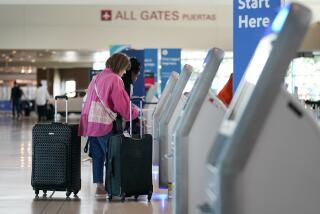Airlines Look for Federal Aid
WASHINGTON â Airline executives told Congress on Thursday that their companies still face major financial problems that probably will worsen if the U.S. goes to war with Iraq.
Air travel has not returned to pre-Sept. 11 levels. The number of people flying in November was down almost 18% from November 2000, the Transportation Department said.
Since the terrorist attacks on the World Trade Center and the Pentagon, the major airlines have laid off more than 80,000 employees, cut wages for others and reduced the number of flights, but they still expect to lose $9 billion for 2002. Two have filed for bankruptcy in the last six months -- United Airlines and US Airways.
âWeâve got most of the airlines broke and the rest of them begging,â said Sen. Ernest F. Hollings of South Carolina, the ranking Democrat on the Commerce Committee, which held a hearing on the financial condition of the airlines.
War in Iraq could make a bad situation even worse, American Airlines chief executive Don Carty told the committee. When the Persian Gulf War occurred in 1991, Carty said, air travel plummeted.
Congress has helped the airlines twice since Sept. 11, 2001. In November that year, President Bush signed a $15-billion aid package that included $5 billion in cash aid and a $10-billion loan guarantee program. Last year, Congress enacted a law to extend government-issued war-risk insurance and to limit liability against companies in the event of terrorist attacks, saving airlines an estimated $1 billion.
More to Read
Inside the business of entertainment
The Wide Shot brings you news, analysis and insights on everything from streaming wars to production â and what it all means for the future.
You may occasionally receive promotional content from the Los Angeles Times.










